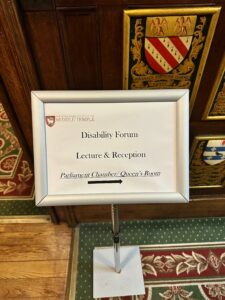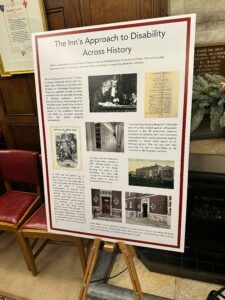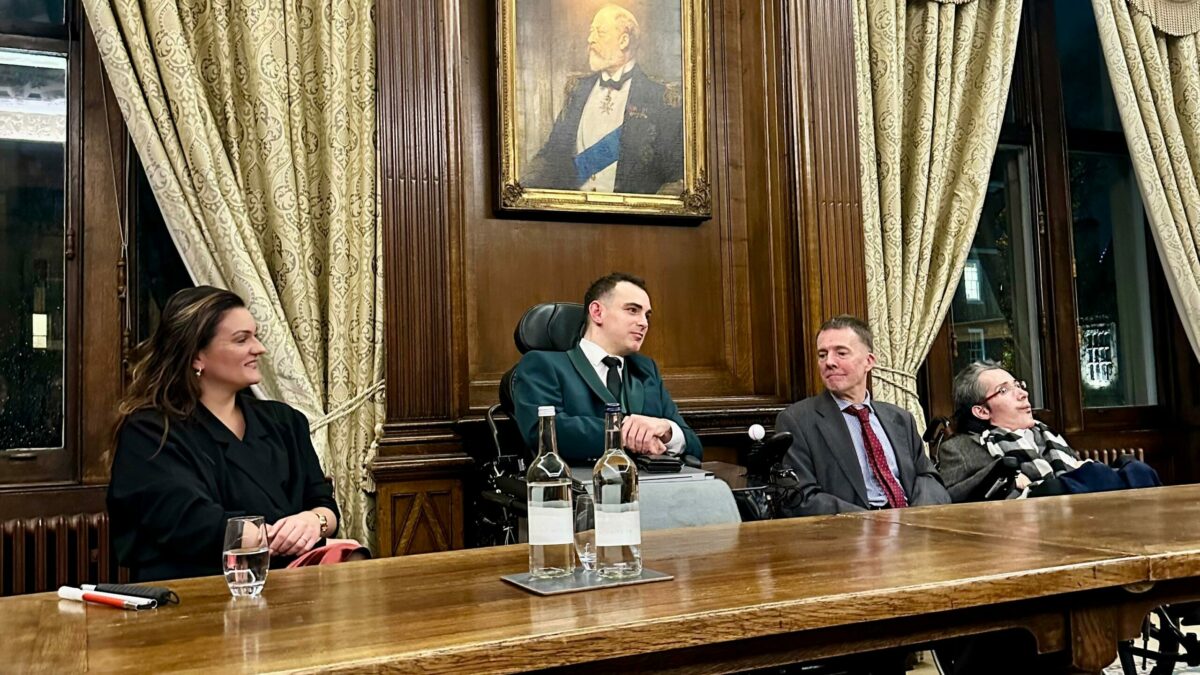
A.K. v Russia [2024]
December 8, 2024
Commercial Awareness Update – W/C 9th December 2024
December 10, 2024By Christianah Omobosola Babajide.
Reading time: five minutes
“Disability is inevitable—it is not an ‘if,’ it is a ‘when.'” — Christina Warner
Last week, I had the privilege of attending the launch of the Honourable Society of Middle Temple’s Disability Forum, held during Disability History Month. The evening brought together a distinguished panel of speakers who spoke of the ongoing struggles with accessibility, inclusion and representation at the Bar. The event began with a stirring performance by Miss Jacqui, a powerchair user and spoken-word artist. Her poetry eloquently addressed themes of being overlooked, judged, and underestimated, ending on a powerful note urging the audience to persevere and believe in their abilities.
The panellists concluded of:
- Daniel Holt – Barrister and Chair of the Disability Forum.
- Christina Warner – Barrister, disability rights activist and Vice-Chair of Bar-Related Activity for the Association of Disabled Lawyers.
- Diego F. Soto-Miranda – Barrister at 1EC Chambers, specialising in commercial law, defamation, and human rights.
- Mark Neale – Director-General at the Bar Standards Board (BSB) and Co-Chair of its Disability Taskforce.

Daniel Holt’s journey to the Bar hasn’t been without its challenges; he has worked hard to build a career in law despite being told that his speech impediment, use of a wheelchair, and special-needs education would stand in his way. Those obstacles only strengthened his resolve; as he went on to study Law at City, University of London and St George’s, Queen Mary University of London, earning two master’s degrees with distinction. Holt says he’s always “wanted to be a barrister, it’s the only job that appealed to me.” He says he enjoys the job, he knows he has much difficulty, his opponents in court have always been helpful and he gets on well with them – working with others is a part of the job he enjoys.
When Christina Warner began to lose her eyesight during lockdown, she had two options:
- Do I let it consume me? Or
- Do I let it fuel me?
Warner was born able-bodied but started to lose her eyesight, similar to her parents, grandparents and brother. In 2021, she was diagnosed with Stargardt disease (Juvenile Macular Degeneration); a genetic condition that causes progressive sight loss and, in some cases, blindness. Losing her eyesight meant that she had to make certain adjustments including surrendering her driving license and adding more lights to her home, to help see better. Warner says, “Coming out of the disabled closet forces you to stop masking.” She went on to list the pros and cons of being blind. Wanting to end on a positive note, she listed her cons first, which were:
- Dealing with a dehumanising system of the Access to Work scheme.
- People being dismissive and ignorant towards her.
- The court staff being inadequately trained to offer support to disabled people for example, she recalled court staff telling her, “you don’t look blind!”, or asking her to tell them how many fingers they have held up.
The Bloomberg Abilities Community hosted their annual event, aimed at tackling stigmas surrounding disability within the workplace, read the event summary: https://thestudentlawyer.com/2024/11/28/powers-of-abilities-removing-barriers-at-bloomberg/
She went on to list the pros, including:
- By her mentioning to her client(s) that she is visually impaired, this encourages them to open up and connect with her on a deeper level.
- Solicitors seek her directly because their client(s) is disabled and they want a barrister with lived experience.
- Finding her community with individuals like Soto-Miranda and Holt, who understand her struggles.
Warner left the audience with two pieces of advice; “If you are disabled and want to practice at the Bar, go for it. If you have developed a disability, keep going – the only way is through.”
Read this article to find out how legislation can advance equality for people with disabilities: https://thestudentlawyer.com/2024/08/23/the-role-of-legislation-in-advancing-equality/
Diego F. Soto-Miranda recalls being told he didn’t have the physical ability to do the job of a barrister, however, he ended things on a positive note saying the chambers he did his third-six at didn’t have reasonable adjustments but provided them for him, as time went on.
How the BSB can help
Mark Neale, who was representing the BSB – the regulator of the Bar, stressed the importance of promoting a strong and diverse Bar and achieving equality for people with disabilities, something that is very much in the public interest. He also addressed the challenges including inaccessible chambers without lifts (due to most being listed buildings), which meant disabled barristers and clients were unable to get through the front door. This has a knock-on effect on the size of the talent pool that apply to the Bar, since disabled people won’t apply to non-inclusive chambers.
Read this article to find out how British courtrooms can become more accessible: https://thestudentlawyer.com/2024/07/15/how-do-we-make-our-british-courtrooms-more-accessible/
Neale highlighted the ways the BSB can help to change perceptions, including:
- Raising awareness and publicity.
- Introducing the Disability Taskforce, which was launched in 2022, at 7BR, one of the few chambers with state-of-the-art disabled access (also known as the Sesame Steps).
- Publishing reports that will educate the general public.
- Proposals relating to equality for disabled barristers include:
- requiring all chambers to undertake a disability audit;
- drawing up plans to address accessibility issues; and
- establishing a duty of care to ensure all rooms in chambers, including the clerks’ room and meeting rooms, are accessible.
Neale stressed that in order for people’s attitudes to be changed, all members must be willing to challenge chambers through a joint venture between the Bar, the BSB and Bar Council, because the issues aren’t solely regulatory.
Read this article to learn about legal inclusivity for the D/deaf community: https://thestudentlawyer.com/2024/03/24/legal-inclusivity-for-the-d-deaf-community/
Navigating burnout at the Bar
A member of the audience asked the panel how best to navigate burnout with a disability. The three panellists advised:
- The Bar can be emotionally taxing so do your background research and know who you’re fighting against.
- Avoid running on fumes; communicate with your clerks, let them know when you need a ‘reading day’ to catch up on the washing up from the previous case. Rest time is equally as important as work time.
- Practice discipline with your out-of-work commitments and self care. When you allow work to eat into the things you enjoy doing in your spare time, it breeds resentment and causes burnout.
- How you achieve rest depends on you but remember that diamonds are made under pressure but bread rises when it rests.
A Collective Commitment
The event underscored both the strides made towards equality at the Bar and the significant work that remains. A key takeaway is the importance of personal responsibility in educating ourselves on how to best support colleagues and clients with disabilities. True progress begins with understanding, and it is only by actively seeking to learn and challenge our own assumptions and unconscious bias that we can create meaningful change.

Read more about whether the legal profession is fit for those with disabilities: https://thestudentlawyer.com/2024/05/01/is-the-legal-profession-fit-for-people-with-disabilities/





